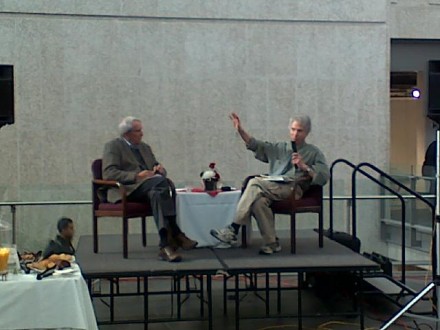The documentary Soundtrack for a Revolution tells the story of the American Civil Rights movement through the music sung at protests, during meetings and in jail cells. This is the premise of the film, but it is not what the film is truly about. Rather, Soundtrack for a Revolution is about the struggle for freedom and what it takes to get there. The film describes the degradation, fear and suffering felt by nearly all of those involved in the civil rights movement, and how music united and strengthened all those fighting for change.
The film begins with Rosa Parks and the Montgomery Bus Boycott of 1955-56. The boycott lasted 381 days and ended racial segregation laws on buses in Montgomery, Alabama. This first victory led the way for future protests and made Martin Luther King Jr. a national figure for the Civil Rights movement. From there, the film describes the movement’s commitment to non-violent protest, despite constant threats and abuse by those that opposed racial equality. Participants of sit-ins were actually trained to withstand heckling and abuse by white citizens and law enforcement without resorting to violence. Old footage of peaceful protestors being beaten and dragged out of Woolworth’s in North Carolina demonstrates both the restraint of those participating and the seemingly endless cruelty of their abusers.
Soundtrack for a Revolution describes the American Civil Rights movement from the point of view of the people most involved. The film features interviews with key members including John Lewis, who was instrumental in organizing the Selma to Montgomery marches of 1965. These revolutionary figures bring the events of the movement to life with vivid and heartbreaking stories about what it meant to be black in 1950s and 60s America. Suffering was a normal part of life, and as one interviewee states, death was always a possibility.
Still, members of the civil rights movement found cause to be happy. At group meetings members would sing songs together to express the suffering that they felt and to carry on the oral traditions of their ancestors. Harry Belafonte, an American musician and activist, describes the music that came out of the American civil rights movement as “not created by us; it was throughout our entire stream of history. The oral tradition has been the only tradition that has been able to sustain black life in America, the only tradition through which we are able to know who we are.” This comment, as well as many others made throughout the film, sheds new light on the way we understand the history of this extraordinary movement.
In the end, this film is a story about the individuals whose sacrifices we know too little about, and in this it succeeds brilliantly. But the music of the American civil rights movement still has its place. Music may not have brought down racial segregation, but it provided strength and comfort to those who did.
Soundtrack for a Revolution is playing at Cinematheque from July 30 – August 4.




